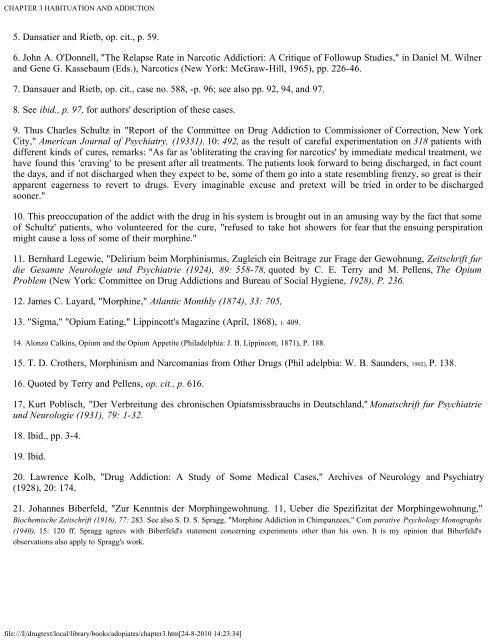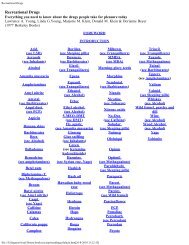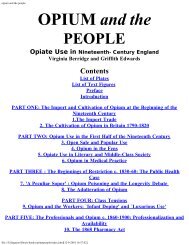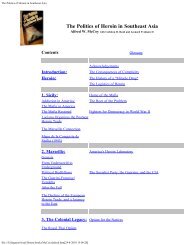Addiction and Opiates
Addiction and Opiates
Addiction and Opiates
Create successful ePaper yourself
Turn your PDF publications into a flip-book with our unique Google optimized e-Paper software.
CHAPTER 3 HABITUATION AND ADDICTION<br />
5. Dansatier <strong>and</strong> Rietb, op. cit., p. 59.<br />
6. John A. O'Donnell, "The Relapse Rate in Narcotic Addictiori: A Critique of Followup Studies," in Daniel M. Wilner<br />
<strong>and</strong> Gene G. Kassebaum (Eds.), Narcotics (New York: McGraw-Hill, 1965), pp. 226-46.<br />
7. Dansauer <strong>and</strong> Rietb, op. cit., case no. 588, -p. 96; see also pp. 92, 94, <strong>and</strong> 97.<br />
8. See ibid., p. 97, for authors' description of these cases.<br />
9. Thus Charles Schultz in "Report of the Committee on Drug <strong>Addiction</strong> to Commissioner of Correction, New York<br />
City," American Journal of Psychiatry, (19331), 10: 492, as the result of careful experimentation on 318 patients with<br />
different kinds of cures, remarks: "As far as 'obliterating the craving for narcotics' by immediate medical treatment, we<br />
have found this 'craving' to be present after all treatments. The patients look forward to being discharged, in fact count<br />
the days, <strong>and</strong> if not discharged when they expect to be, some of them go into a state resembling frenzy, so great is their<br />
apparent eagerness to revert to drugs. Every imaginable excuse <strong>and</strong> pretext will be tried in order to be discharged<br />
sooner."<br />
10. This preoccupation of the addict with the drug in his system is brought out in an amusing way by the fact that some<br />
of Schultz' patients, who volunteered for the cure, "refused to take hot showers for fear that the ensuing perspiration<br />
might cause a loss of some of their morphine."<br />
11. Bernhard Legewie, "Delirium beim Morphinismus, Zugleich ein Beitrage zur Frage der Gewohnung, Zeitschrift fur<br />
die Gesamte Neurologie und Psychiatrie (1924), 89: 558-78, quoted by C. E. Terry <strong>and</strong> M. Pellens, The Opium<br />
Problem (New York: Committee on Drug <strong>Addiction</strong>s <strong>and</strong> Bureau of Social Hygiene, 1928), P. 236.<br />
12. James C. Layard, "Morphine," Atlantic Monthly (1874), 33: 705,<br />
13. "Sigma," "Opium Eating," Lippincott's Magazine (April, 1868), 1: 409.<br />
14. Alonzo Calkins, Opium <strong>and</strong> the Opium Appetite (Philadelphia: J. B. Lippincott, 1871), P. 188.<br />
15. T. D. Crothers, Morphinism <strong>and</strong> Narcomanias from Other Drugs (Phil adelpbia: W. B. Saunders, 1902), P. 138.<br />
16. Quoted by Terry <strong>and</strong> Pellens, op. cit., p. 616.<br />
17, Kurt Poblisch, "Der Verbreitung des chronischen Opiatsmissbrauchs in Deutschl<strong>and</strong>,'' Monatschrift fur Psychiatrie<br />
und Neurologie (1931), 79: 1-32.<br />
18. Ibid., pp. 3-4.<br />
19. Ibid.<br />
20. Lawrence Kolb, "Drug <strong>Addiction</strong>: A Study of Some Medical Cases," Archives of Neurology <strong>and</strong> Psychiatry<br />
(1928), 20: 174.<br />
21. Johannes Biberfeld, "Zur Kenntnis der Morphingewohnung. 11, Ueber die Spezifizitat der Morphingewohnung,"<br />
Biochemische Zeitschrift (1916), 77: 283. See also S. D. S. Spragg, "Morphine <strong>Addiction</strong> in Chimpanzees," Com parative Psychology Monographs<br />
(1940), 15: 120 ff. Spragg agrees with Biberfeld's statement concerning experiments other than his own. It is my opinion that Biberfeld's<br />
observations also apply to Spragg's work.<br />
file:///I|/drugtext/local/library/books/adopiates/chapter3.htm[24-8-2010 14:23:34]





